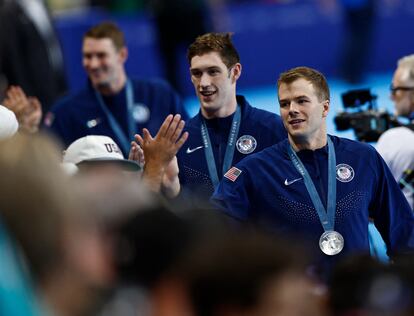United States loses its dominance in swimming, as Australia, France and China win gold
The team collected eight gold medals out of the 34 at stake in Paris, the lowest haul of a tournament since the Melbourne Games in 1956

The Olympic swimming championships began with Katie Ledecky exposing the institutional cover-up of doping by Chinese swimmers and bringing the semi-cold war between the United States and the great Asian power to the pool. The dispute culminated a week later in the battle of the medley relays, Pan Zhanle’s last act. The Chinese swimmer became the first man to swim 100 meters in under 46 seconds and gave his country the gold medal in the 4x100m medley, a trophy that the United States had not lost since it was established in the 1960 Games.
When Zhanle came into the race in the final leg, China was in third place. France, led by Yohann Ndoye-Brouard, León Marchand and Maxime Grousset, was in first place with Florent Manaudou, and the United States was in second place with Hunter Armstrong. What followed will go down in the annals of science: Zhanle overtook the others, achieving a one-meter lead. He touched the last wall in 45.92 seconds and secured the gold for China in the men’s 4x100 medley relay, one of the most prestigious races of the swimming competition. And thus ended, the U.S. men’s team worst results in the pool since 1956.
At the Melbourne Games in 1956, the United States took home more than 15% of the gold medals in swimming — the lowest point of their dominance in the pool. Since then, the country that has won more than 30% of the gold medals — a percentage that even exceeded 50% in several Olympic events. That began to change in the 2020 Tokyo Games, held in the midst of the Covid-19 pandemic, where the team — now without star swimmers Michael Phelps and Ryan Lochte — showed signs of exhaustion and took 29% of the gold medals.
In Paris, the U.S. team won just 23% of the gold medals in swimming, sharing the top of the podium with Australia (7 gold medals), France (4), Canada (3), Italy (2), Hungary (2) and China (2). It won just eight gold medals out of a total of 34. The worst result in more than half a century, and the second worst in Olympic history. It would not have won a single individual men’s gold in swimming if Bobby Finke had not appeared on the scene yesterday.
“The wealth has just been spread around!” said Caeleb Dressel, who won five gold medals in Tokyo, and one in Paris in the 4x100 freestyle, as well as a silver in the 4x100 medley. “It’s good for the sport to have the whole world involved,” he said, adding that the U.S. were still at the top of the medal tally in swimming.
Since the United States started fielded swimming teams at the 1904 Olympic Games, they have always won golds in individual men’s events. Disappointment was hanging over Team USA when Finke set out to defending his Olympic 1,500 title in Tokyo after falling behind Ireland’s Daniel Wiffen in the 800-meter freestyle. Finke did not disappoint. After just one meter, he was swimming at world record pace. With Gregorio Paltrinieri close at his heals, the swimmer from Tampa had to worry about keeping up the kick cycle. His feet must have been burning when he finished the race in 14m 30.67s. The mark shaved half a second off Sun Yang’s record, set at the 2012 Olympic Games: 14m 31.02s. Today, Sun Yang has been sanctioned for breaching World Anti-Doping Agency rules. But his records have not been erased.
The organizer of the Paris Olympic Games and pool manufacturer Myrtha — the company that has made the deepest and fastest pools in history — claimed from day one that the prefabricated pool at La Défense would see fast races. This was despite its relatively shallow depth of 2.2 meters, which goes against World Aquatics 2023 regulations, and slowed down the propulsion of swimmers, especially the male competitors. The verdict in Paris was 16 Olympic records and four world records, including the mixed medley. In Tokyo, 25 Olympic records and five world records were broken; in Rio, 15 Olympic records and eight world records were set; and in London, 16 Olympic records and eight world records were made. In Beijing, Athens and Sydney, when waterproof swimsuits were still allowed, even more records were set.
Based on the average number of world records, the Paris Games recorded the slowest races of the century. The fact that Pan Zhanle was able to swim the last 100 meters of freestyle in the medley in under 46 seconds despite this, highlights the scale of his achievement.
Sign up for our weekly newsletter to get more English-language news coverage from EL PAÍS USA Edition
Tu suscripción se está usando en otro dispositivo
¿Quieres añadir otro usuario a tu suscripción?
Si continúas leyendo en este dispositivo, no se podrá leer en el otro.
FlechaTu suscripción se está usando en otro dispositivo y solo puedes acceder a EL PAÍS desde un dispositivo a la vez.
Si quieres compartir tu cuenta, cambia tu suscripción a la modalidad Premium, así podrás añadir otro usuario. Cada uno accederá con su propia cuenta de email, lo que os permitirá personalizar vuestra experiencia en EL PAÍS.
¿Tienes una suscripción de empresa? Accede aquí para contratar más cuentas.
En el caso de no saber quién está usando tu cuenta, te recomendamos cambiar tu contraseña aquí.
Si decides continuar compartiendo tu cuenta, este mensaje se mostrará en tu dispositivo y en el de la otra persona que está usando tu cuenta de forma indefinida, afectando a tu experiencia de lectura. Puedes consultar aquí los términos y condiciones de la suscripción digital.









































